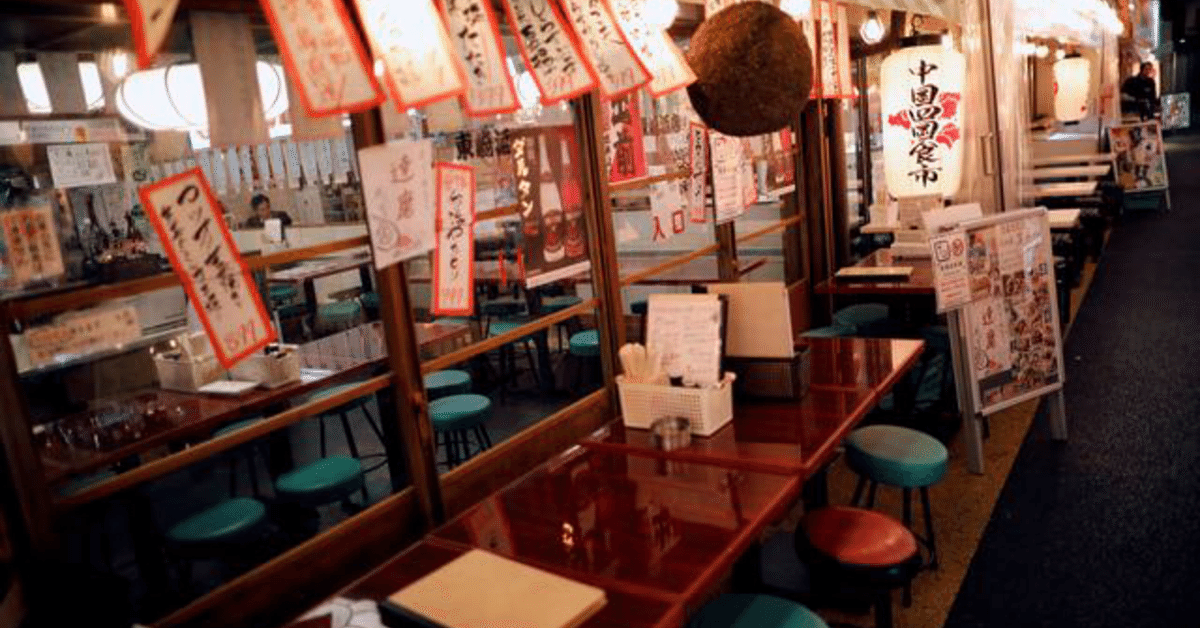
ウイルスが日本を襲うと、バーやレストランが苦しむ一方で、デフレのリスクが高まる≒ As virus hits Japan, deflation risks grow while bars, restaurants suffer 金子かおり
As virus hits Japan, deflation risks grow while bars, restaurants suffer
Kaori Kaneko
https://mobile.reuters.com/article/amp/idUSKCN21Y0D0#click=https://t.co/vcBEkzXh7d

Photo
FILE PHOTO: Empty seats are seen at a restaurant, following the outbreak of the coronavirus disease (COVID-19), at Ginza shopping and amusement district in Tokyo, Japan April 2, 2020.
REUTERS/ISSEI KATO/FILE PHOTO
TOKYO (Reuters) - For someone like Sumako Furihata, who owns two small restaurants in Tokyo's Akasaka nightlife district, the coronavirus health crisis has been a nightmare that crushed sales and put her in a difficult situation.
Many of her rivals in the district, which relies on lunch and dinner demand from business workers, are also suffering as more companies have employees work from home at the government's request.
"The pace of fall in sales is much faster than during the global financial crisis," said Furihata, who has temporarily shut down one of her restaurants.
ADVERTISEMENT
The pandemic has throttled an economy already on the brink of recession as social distancing policies have forced sectors such as transport, retail and tourism to temporarily scale down.
Economists say the outbreak also risked increasing deflationary pressure in Japan as people stay at home more and spend less.
"Prices for 'stay-at-home' related products such as foods are firm. But overall, there's an increasing risk Japan may slip back into deflation," said Hiroshi Ugai, chief economist at JPMorgan Securities Japan.
Ugai, who predicts Japan's economy will contract 4.4% this year, warned that prices for a range of goods will start falling around autumn.
An early snapshot of how Japanese businesses coped with the outbreak in March showed that retailers like Furihata were hit hardest, while other sectors got some respite.
The Nowcast private survey that captures real-time consumption trends – making it a leading indicator of government data – showed consumer spending index falling nearly 10% for hotels, about 28% for amusement parks, 14% for airplane tickets and more than 16% for train tickets during March 16-31, compared with a year earlier.
ADVERTISEMENT
Many took a hit from the government's decision this month to declare a state of emergency for major population centres, including Tokyo, to combat the virus. The declaration urged citizens to stay at home, some facilities to shut down and restaurants to close early.
Movement of people around Tokyo station, a major transportation hub, dropped nearly 50% on April 15 from levels before the state of emergency announcement on April 7, according private data firm Agoop.
The number of people using major train stations such as Tokyo, Shinjuku and Ueno dropped more than 70% on April 13 from a year earlier, and that of western Osaka station slumped more than 60%, according to data compiled by the government.
There were some areas that were less affected, or even saw demand rise because of social distancing and work-from-home policies.
Coffee shops saw consumption increase more than 4% on demand from employees visiting cafes while teleworking.
Liquor shops saw spending rise 10% as bars closed. Supermarkets experienced more than a 14% rise in consumption, as they catered to households preparing more food at home.
ADVERTISEMENT
But overall, prices are being pushed down.
(For graphics on consumption indexes by business category and overall, click: reut.rs/3erWOJ2, reut.rs/3bg2nYX )
Already, Japan is seeing bankruptcies creep up, particularly in the service sector. If the pandemic persists, the number could spike and lead to more job losses. That would dent the spending power of households, thus putting more downward pressure on prices, analysts say.
"If the number of unemployed rise, that will leave households with less purchasing power. That puts downward pressure on overall prices," said Takeshi Minami, chief economist at Norinchukin Research Institute.
Even if prices creep up, it could be for the wrong reasons. If the pandemic keeps factories in the world's third-largest economy from resuming operations for too long, that could hamper companies from producing enough goods.
"If companies need to scale down production lines for daily necessities, supply could shrink and prices of those produce may rise," Minami said.
ADVERTISEMENT
(Interactive graphic tracking global spread of coronavirus: open tmsnrt.rs/3aIRuz7 in an external browser. )
(Reporting by Kaori Kaneko; Additional reporting by Hiroko Terui; Editing by Leika Kihara, Gerry Doyle & Shri Navaratnam)
Our standards: The Thomson Reuters Trust Principles.
ウイルスが日本を襲うと、バーやレストランが苦しむ一方で、デフレのリスクが高まる
金子かおり
ファイルの写真:2020年4月2日、東京の銀座のショッピングおよびアミューズメント地区のコロナウイルス病(COVID-19)の発生に続いて、レストランの空席が見られます。
ロイター/加藤一成/ファイル写真
東京(ロイター)-東京の赤坂のナイトライフ地区に2つの小さなレストランを所有しているフリハタシュマコのような人にとって、コロナウイルスの健康危機は、売り上げを押しつぶし、彼女を困難な状況に置く悪夢でした。
企業の労働者からの昼食と夕食の需要に依存している地区の彼女のライバルの多くは、政府の要請により従業員が自宅で仕事をする会社が増えるにつれて、苦しんでいます。
「世界的な金融危機のときよりも、売上の落ち込みのペースははるかに速い」と彼女のレストランの1つを一時的に閉鎖したフリハタは言った。
社会的距離政策が輸送、小売、観光などのセクターを一時的に縮小するように強いているので、パンデミックはすでに不況の瀬戸際にある経済を抑制しました。
エコノミストは、人々がより多くの家にとどまり、費やす時間が少なくなるにつれて、この発生は日本におけるデフレ圧力の増大の危険を冒したとも述べています。
JPMorgan Securities Japanのチーフエコノミスト、鵜飼浩氏は、「食品などの「在宅」関連商品の価格は堅調であるが、全体として、日本がデフレに陥るリスクが高まっている」と語った。
日本の経済が今年4.4%縮小すると予測しているウガイは、様々な商品の価格が秋頃に下落し始めると警告しました。
日本の企業が3月の大発生にどのように対処したかを示す初期のスナップショットは、フリハタのような小売業者が最も大きな打撃を受けた一方で、他のセクターはある程度の停滞を経験したことを示しています。
政府のデータの主要な指標となるリアルタイムの消費傾向を捉えたNowcastの民間調査によると、ホテルの消費支出指数は約10%、遊園地は約28%、飛行機のチケットは14%、航空券は16%以上下落しています。 3月16日から31日までの列車の切符は、1年前と比較して。
今月、東京を含む主要な人口密集地がウイルスと戦うための緊急事態を宣言するという政府の決定から多くの人が打撃を受けました。 宣言は市民に家にとどまるように、いくつかの施設を閉鎖するようにそしてレストランが早く閉まるように促しました。
民間のデータ会社アグープによると、主要な交通ハブである東京駅周辺の人々の動きは、4月7日の緊急事態発表前の水準から4月15日には約50%低下した。
政府の集計によると、東京、新宿、上野などの主要駅の利用者数は4月13日、前年比70%以上減、大阪西部駅は60%以上の急減となった。
社会的距離と在宅勤務のポリシーにより、影響が少ない、または需要の増加さえ見られるいくつかの領域がありました。
コーヒーショップでは、在宅勤務中にカフェを訪れる従業員からの要求により、消費量が4%以上増加しました。
バーが閉店したため、酒屋の支出は10%増加しました。 スーパーマーケットでは、家庭でより多くの食品を調理する世帯に対応するため、消費量が14%以上増加しました。
広告
しかし、全体として、価格は押し下げられています。
(ビジネスカテゴリ別および全体の消費指数に関するグラフィックについては、reut.rs / 3erWOJ2、reut.rs / 3bg2nYXをクリックしてください)
すでに日本では、特にサービス部門で倒産が拡大している。 パンデミックが持続する場合、その数は急上昇し、さらに多くの失業につながる可能性があります。 アナリストたちは、それは家計の消費力を弱め、価格の下落圧力をさらに高めるだろうと語った。
農林中金研究所のチーフエコノミスト、南武氏は、「失業者数が増加すると、世帯の購買力が低下する。全体の価格に下向き圧力がかかる」と述べた。
価格が急騰したとしても、それは間違った理由による可能性があります。 パンデミックにより世界第3位の経済の工場が長時間にわたって操業を再開できなくなると、企業が十分な製品を生産できなくなる可能性があります。
「企業が日用品のために生産ラインを縮小する必要がある場合、供給が縮小し、それらの生産物の価格が上昇する可能性がある」とミナミ氏は語った。
(コロナウイルスのグローバルな広がりを追跡するインタラクティブなグラフィック:外部ブラウザーでtmsnrt.rs/3aIRuz7を開きます。)
(金子香織による報告、照井裕子による追加報告、木原レイカ、ゲリー・ドイル、シュリ・ナヴァラットナムによる編集)
この記事が気に入ったらサポートをしてみませんか?
